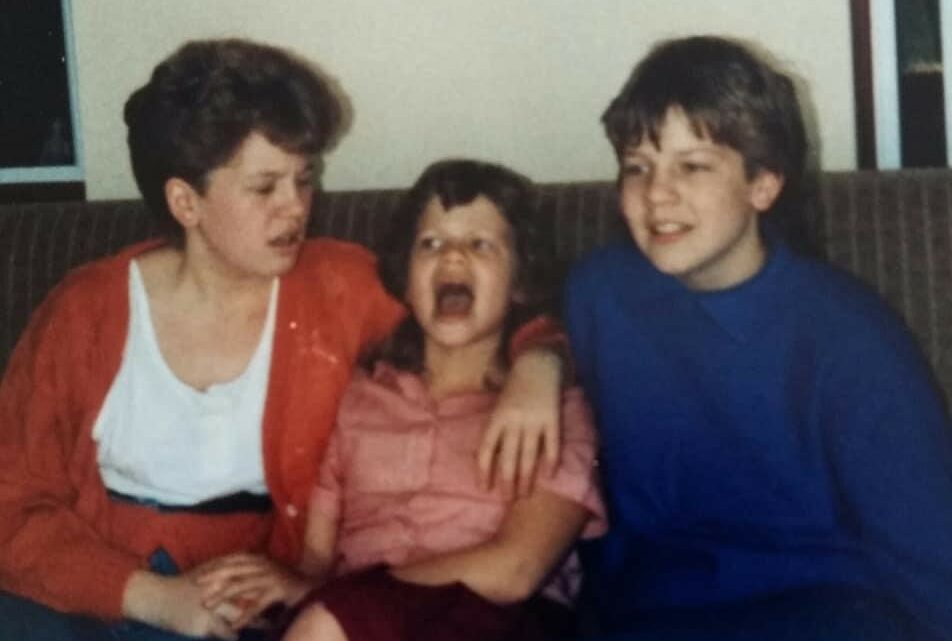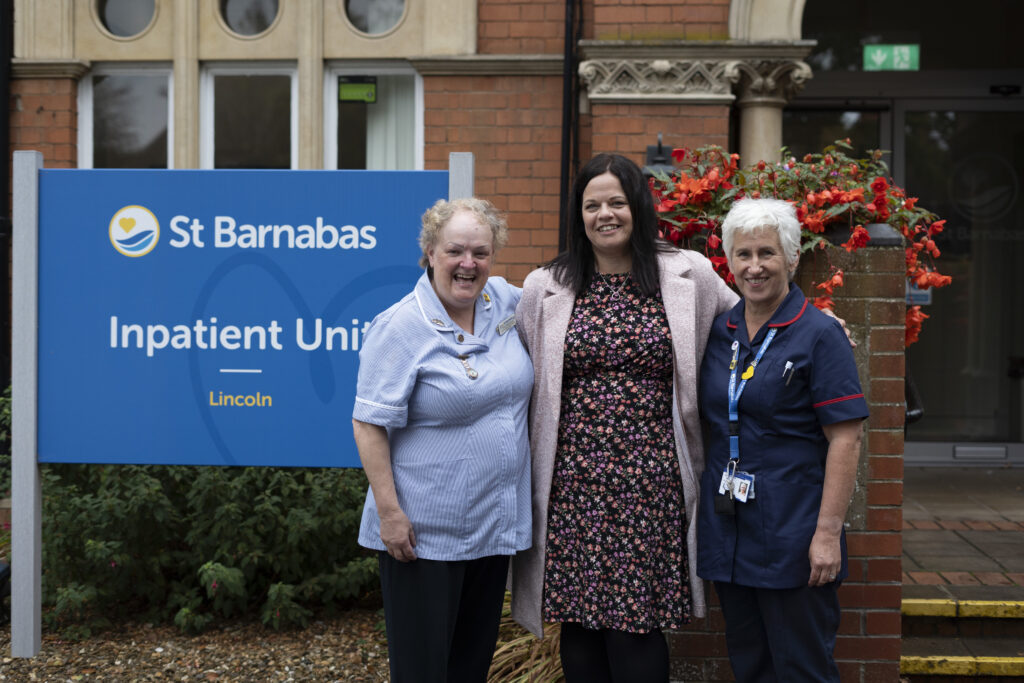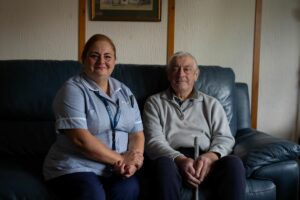Category: Hospice News
Suzanne Sheppard dedicates a light in memory of her beloved sister: “All the nurses got her smiling, even when she was at her lowest.”
“This Christmas will be another without my sister Caroline, but it warms my heart to know that we can still celebrate her remarkable life thanks to Light up a Life, where one of the symbolic lights on the Tree of Life will be shining brightly in memory of her.”
Suzanne Sheppard, originally from Grantham, lost her big sister Caroline in the summer of 2023, who she describes as a strong, independent and career-driven woman.
Caroline was the oldest of three sisters and ‘the boss’ of her entire family. She loved to spend time gardening and baking and was devoted to her husband and family.
Suzanne said: “My big sis particularly loved live music and enjoyed going to watch her favourite bands perform.”
For many years, Caroline experienced regular discomfort but after several tests, nothing was detected. Unfortunately further scans discovered tumours, and devastatingly, Caroline was diagnosed with terminal endometrial perinatal metastasis.
Suzanne continues: “Caroline’s cancer diagnosis turned our lives upside down. At the time she had only been married a couple of months.
“Initially she was treated with chemotherapy, followed by a hysterectomy with the hope of removing all the tumours. However, this was unsuccessful, and her treatment continued, with further chemotherapy and a number of clinical trials.”
At the very beginning of this journey, Caroline contacted St Barnabas, and both herself and her family began to benefit from their services.
Suzanne shares more about their experience: “Caroline had counselling sessions as well as Hospice at Home support. In particular, her nurse Majella was amazing and became a new strength for Caroline, and us, when times were tough.
“I was also able to receive counselling, which was amazing at providing me with a better outlook on some of the difficult questions I had.”
Sadly, even after further surgery, Caroline’s cancer spread to her lungs and liver.
Suzanne continues: “In June 2023, Caroline was admitted to the St Barnabas Inpatient Unit in Lincoln. I would describe it as a place of care with such a warm, homely vibe and a great cup of tea.
“The Hospice staff and volunteers were amazing. I remember one day when she was quite weak, a volunteer had her laughing, and it was so lovely to see. All the team got her smiling even when she was at her lowest. They treated her with so much dignity and respect.”
Unfortunately, Caroline’s condition didn’t improve and she died on Monday 3rd July, less than one week before her 51st birthday.
Suzanne said: “On the morning Caroline died, the Inpatient staff gave us the time and space we needed to be with her and gather our thoughts.
“They lit a candle for her and another lady who had passed, and I found such comfort from that alone. They looked after her in more ways than I could have ever imagined.”
This Christmas, St Barnabas Hospice invite you to dedicate a light on their Tree of Life and attend the Torchlight Procession on Tuesday 19th November.
“Our mother and I attended the Torchlight Procession last year, just before our first Christmas without Caroline. It was such a memorable event, and we found peace in sharing the experience with others who had lost a loved one.
“This Christmas, please join me in remembering your loved ones in a celebration of light. I am inviting you to dedicate your light for a loved one so they can shine brightly on St Barnabas Hospice’s beautiful Tree of Life outside Lincoln Cathedral.”
You can remember anyone with a light, not just those cared for by the Hospice. As a thank you and token for your loved one, St Barnabas will send you a personalised card and special tree decoration in the post.
Your donation for a light could pay for more people like Caroline, and her family, to receive specialist end-of-life care during the most difficult of times.
St Barnabas ‘Hospice in the Hospital’ celebrates 10-year anniversary of providing vital care to patients and families in Grantham
On Friday 6th September, St Barnabas Hospice hosted an intimate event to celebrate 10 years of their ‘Hospice in the Hospital’ service at Grantham and District Hospital.
Attendees included St Barnabas executives, trustees, volunteers and clinical staff, alongside members of the community who have been integral in supporting and fundraising for the charity’s services in Grantham and surrounding areas.
The intimate event, which took place at the Hospice in Grantham itself, was hosted to celebrate the 10-year anniversary of the opening of the ward, which first opened on Monday 8th September 2014.
The first patient was admitted the following day, on Tuesday 9th September 2014, and since that time, nearly 1,500 patients have been admitted to the Hospice.
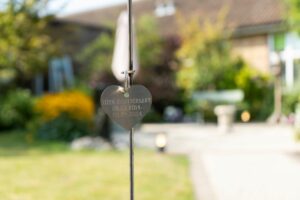
“An overarching impression is that the Grantham Community have embraced the Hospice and support us extremely well, with donations of equipment and sometimes cake!
“We have a wonderful group of volunteers who are very dedicated and for some volunteers they have been supporting the Hospice nearly from the beginning.
“We have also been here to support our wider team at Grantham Hospital when their patients have required hospice care. Staff across the Hospital often “pop in” for a chat or for some support in times of need. This demonstrates the power of the Hospice and the supportive care we are able to give to the wider community.”
Attendees at the event were invited to reflect in the beautiful garden, which has and continues to provide a place of solace for patients and their families.
Alongside this, a dedicated volunteer, Nicki Johnson, whose mum was cared for on the ward, made and delivered homemade cakes for all to enjoy.
A special addition to the event included 10 engraved ironwork feathers in the garden of the Hospice, to represent each year that the ward has been open and providing care.
The feathers were originally part of the Hospice’s in-memory appeal ‘Feathers from Above’ which took place earlier in the year and honoured over 2,000 loved ones who are no longer with us.
St Barnabas Hospice Deputy CEO, Michelle Webb, gave an emotional speech at the event. She said: “On behalf of the Executive Board I would like to express our thanks for a decade of hard work, dedication, and compassionate care.
“Alongside Lisa and her remarkable team, I would like to extend that thanks to our volunteers and generous donors. Your contributions of time and resources have been invaluable, and without you, our work would not be possible.
“To mark this special occasion, we have placed 10 ironwork feathers in our garden, each engraved to symbolise the 10 years of care we’ve provided. I believe you’ll agree that this is a beautiful way to both commemorate our milestone and remember the patients we’ve had the privilege to care for over the past decade.”
St Barnabas Hospice would like to thank all who attended the event, and those who continue to support the Hospice in Grantham, and across the county.
To find out more about St Barnabas’ ‘Hospice in the Hospital’ at Grantham, alongside other care and services provided across Lincolnshire, please visit the St Barnabas Hospice website.
St Barnabas Hospice Executives launch Environmental Sustainability Group in support of Organisational Strategy
In order to protect the future of hospice care and other health services, St Barnabas are aware that it is beneficial to consider the organisation’s environmental impact and how this can potentially be reduced.
As part of the Hospice’s Organisational Strategy, newly launched in 2024, one of the strategic priorities for St Barnabas is to remain sustainable and resilient for the people we care for, including that of environmental sustainability.
In line with this, St Barnabas now operate an Environmental Sustainability Group, encouraging staff across the organisation to meet bi-monthly and discuss progress towards meeting the above priority.
The group comprises of a wide range of staff from varying departments, including two Executives, St.John and Georgina, and Speciality Doctor, Carina, who is based at the Hospice’s Inpatient Unit in Lincoln.
St.John says: “Sustainability is crucial to St Barnabas as it aligns with our core values of care, compassion, and community responsibility.
“By adopting sustainable practices, we not only ensure a healthier environment for our patients, staff, and the wider community but also secure the long-term viability and efficiency of our services. This is in line with our strategic priority to remain sustainable and resilient for the people we care for.”
Georgina comments on the purpose of the group: “The Environmental Sustainability group is developing a strategy to reduce the carbon footprint of the Hospice and promote sustainability.
“The group hopes to achieve this by providing education and awareness through local campaigns and projects. This will include promotion of health and wellbeing initiatives, considering our use of resources, how we manage waste and how we deliver sustainable infrastructures.”
On Monday 8th July, St Barnabas Hospice supported Sustainability Day of Action and shared 7 simple ways to go green at work, with their staff!
- Switch lights off when leaving a room
- Turn radiator thermostat down if room is hot
- Separate waste and recycle responsibly
- Commute by foot, cycle or car-share where possible
- Use a reusable water bottle or coffee cup
- Share documents digitally and think before you print
- Host hybrid meetings and avoid long journeys
Although they may not all, always be possible or relevant to every staff member, volunteer, stakeholder or supporter, it is beneficial to keep these tips in mind.
CEO of St Barnabas Hospice visits Hospice at Home patient who says, “It’s nice to have somebody here”.
After a palliative cancer diagnosis, St Barnabas patient, John, was contacted by the charity and now receives visits and specialist care from their ‘Hospice at Home’ team.
The St Barnabas ‘Hospice at Home’ teams work across Lincolnshire to support patients and their families, to continue living with their diagnosis and plan for their future care.
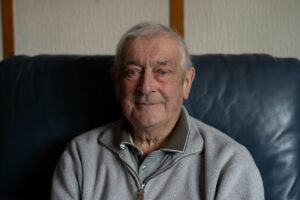
“They put handrails on the stairs, I’ve got a chair in the bathroom which I can sit on, and it lowers me down, and I’ve got grab rails in the shower so that I don’t fall.
“They put in place things like that for me which are very, very helpful.”
Further to practical adjustments, the St Barnabas ‘Hospice at Home’ team have provided John with vital wellbeing support.
He says: “It’s nice to have somebody here to talk to. They come and have a chat with me, ask me how I am, and if there is anything they can do.
“When you’re on your own, it’s lonely, and you get a bit fed up at times, but I’m very happy with them and they’ve been very good to me”.
St Barnabas Chief Executive Officer Chris Wheway makes it a priority to accompany ‘Hospice at Home’ teams on their visits to patients in communities across Lincolnshire, every month.
On a recent visit, Chris was able to meet John.
Chris shares how visits like this impact the work of him, and his colleagues, at St Barnabas: “For me, it’s incredibly important that I know what every decision and meeting I go to is grounded in, and it’s grounded in the people we serve.
“Hospice at Home care is an incredibly powerful and vital service in Lincolnshire, where we meet people when they are at their most vulnerable.
“I love to come out and meet real people who are facing the real challenges of end-of-life care, just like John.”
Chris was accompanied on his visit to meet John by St Barnabas Health and Rehabilitation Support Worker, Julie.
She says: “When people are diagnosed with a palliative illness, it’s quite a devastating thing for that person.
“I think St Barnabas provide a brilliant service in making sure that person is living their best life.”
Last year, St Barnabas were involved in the triage or care of 3,340 people in their own homes.
The cost of caring for a patient, like John, in their own home for one hour, is £19.93.
To help St Barnabas staff, like Julie, care for more people, like John, please visit the St Barnabas Hospice website, and find out about all the ways you can get involved.
Warwick Davis shares how leaving a gift in your Will can support St Barnabas Hospice
Every day, St Barnabas Hospice are privileged to see the impact that legacy donors make on the services they provide to the people of Lincolnshire.
These remarkable gifts help to expand their services, set up new initiatives and support staff.
Since opening their doors to their first patient over 40 years ago, more than 100,000 people have received free, compassionate end-of-life care and support from the charity.
Warwick Davis, Patron and legator of St Barnabas Hospice, shares how with your help, the Hospice can keep caring for the Lincolnshire community for years to come.
Warwick said: “Hospice care is a vital part of countless lives, and no one appreciates that more than the patients and their families.
“You see how St Barnabas is there for them no matter what. That’s why some people choose to leave a gift in their will, to say thank you, after we’ve said goodbye.
“The gifts our friends leave in their wills, however big or small, help to keep our doors open and our care flowing.
“Even a small donation can make a huge difference to a patient or their family, when they need it most.”
Nobody understands that more than Ann Gregory, wife of Pete, a St Barnabas patient.
Pete was diagnosed with a grade four glioblastoma in April 2022. Pete, Ann and their family went on to receive care from a variety of services provided by St Barnabas, including Hospice at Home support.
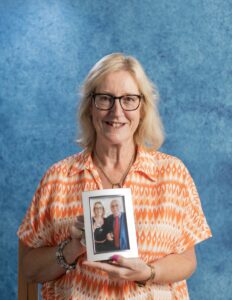
“The support from St Barnabas kept me going, I couldn’t have managed without them.
“From the physiotherapist to the people coming in to talk to Pete about what was going to happen, getting his respect form in and sorting out claims. They just knew what they were doing.”
Helen, Ann’s eldest sister, is another member of the family that has received support from St Barnabas. She said: “I’m not sure there are many other families out there that have received as much support from St Barnabas as we have.
“Sadly, a number of years ago my husband was diagnosed with early onset Alzheimer’s. Approximately five years ago, my youngest sister was diagnosed with incurable secondary breast cancer and then, nearly two years ago, I was also diagnosed with incurable secondary breast cancer.
“We have all received so much support from St Barnabas and we are all so, so grateful.”
St Barnabas understand that leaving a legacy is a deeply personal choice. Wills are an important way of making sure your wishes are known, and that the things you have worked hard for during your life will go to the people and causes that you hold dear.
St Barnabas are able to help you with this and make it as simple as possible.
The Hospice run regular Free Will Cafés in their Wellbeing Centres across the county, where you can meet with a legal professional to gain guidance about making your Will. Find out more about the charity’s upcoming available appointments in Grantham and Lincoln.
Alternatively, there is the opportunity to use a free and simple online service with Octopus Legacy, or ask your solicitor to give you advice about leaving a gift in your Will to St Barnabas.
Warwick and Ann have supported St Barnabas in numerous ways. Now, both as legators of the Hospice pledging: “I have left a gift in my Will to St Barnabas.”
To find out more and give the gift of loving care, please visit the St Barnabas Hospice website, or contact the charity’s Legacy Advisors on 01522 540 300 or legacy@stbarnabashospice.co.uk.
Update; George Henderson Lodge, Gainsborough
St Barnabas Hospice has decided to permanently close the George Henderson Lodge in Gainsborough, which has been unused since 2019.
This decision comes after five years of successfully providing care to the Gainsborough area without the facility. Reopening the lodge would require over £200,000 in refurbishments and £60,000 annually for staffing and operating costs.
The funds from the sale of the property, which was part funded by George Henderson will support the current clinical care in the area.
The hospice’s executive team shared this news with local councillors, residents, volunteers, and supporters on Tuesday, 23rd July at Morton Village Hall.
Chris Wheway, CEO, expressed:
“We recognise that the decision to close the George Henderson Lodge may be disappointing for many. However, given the current financial challenges, this move is essential for ensuring that the Hospice can continue its mission of providing exceptional care to the community.
The COVID-19 pandemic significantly altered how we deliver care at the Hospice. Over the past few years, we have shifted to a model where we provide even more at home care, allowing us to visit and support hundreds of patients each year in the comfort of their own homes. This approach has proven to be effective and aligns with our commitment to patient-centred care.
The Gainsborough area remains as important for St Barnabas as it did. We are dedicated to maintaining our presence and impact in the community and are actively looking for the right retail unit in the area to further support our services.
I want to extend my heartfelt thanks to everyone who has supported the George Henderson Lodge in Gainsborough over the years. Your contributions have been invaluable, and we appreciate the community’s engagement and feedback during the meeting last night. Thank you.”
For information about our Hospice care, well-being support and self-referrals call our Palliative Care Co-Ordination Centre
Meet our Team: Executives at St Barnabas Hospice
St Barnabas Hospice has over 300 members of clinical and non-clinical staff working to support our vision – a world where dying with dignity, compassion and having choices is a fundamental part of a life.
The organisation is also supported by a variety of stakeholders, including Volunteers and Trustees, who donate their time and experience to further support our vision.
The hard work and dedication of all our staff ensures we are able to continue providing vital end of life care, across Lincolnshire.
Important members of our team include our Executives, who are responsible for each of the departments within the Hospice.
Our Executives would like to share with you, who they are, their roles and responsibilities and what they enjoy about working for St Barnabas Hospice.

Chief Executive Officer
Chris joined St Barnabas Hospice in November 2015. Following over 20 years in the NHS, Chris had one ambition: to lead a high-quality, well-regulated organisation capable of caring for more people, making a bigger impact and influencing the rest of the healthcare system that dignified end-of-life care is vital. Not only have we achieved CQC Outstanding rating under Chris’s leadership, but we’re caring for more people each year too.
Chris says: “I love that every single person in our Hospice team is dedicated to making a difference. What they do daily, directly and indirectly, for patients and families is mind-blowing.
“When I go out with our nurses to visit patients at home, I see the care close-up, and it’s a reminder of what it’s all about.”

Deputy Chief Executive
Michelle has worked for St Barnabas Hospice since 2013. Within her role, she is responsible for implementing strategies and plans for the on-going development of Hospice care, sustaining relevant key relationships, with stakeholders and partner organisations, and acting as an ambassador of the Hospice, engaging with the people we support.
Michelle says: “I am truly inspired to work for St Barnabas. I am proud and honoured of leading, supporting and being part of a team who provide compassionate and outstanding care.
“I enjoy the challenge of developing and supporting services and working innovatively to improve care and outcomes for people who use Hospice Services.”
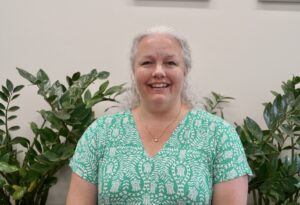
Director of Patient Care
Rebecca began her journey at St Barnabas Hospice in January 2022 as a Senior Clinical Services Manager, moving to Director of Patient Care in March 2023. Within her current role, Rebecca is responsible for all clinical care delivered by the Hospice, alongside being the Lead Director for Safeguarding, Infection Prevention and Control and the Freedom to Speak Up initiative.
Rebecca says: “What I enjoy most is hearing about and seeing the quality and level of care the people of Lincolnshire receive from our Hospice, delivered by our great staff.
“You will often see or hear me with a lump in my throat.”

Medical Director
Georgina has worked for St Barnabas Hospice since 2010. Starting as a Palliative Medicine Consultant, she moved into her current position of Medical Director in 2017. Her role responsibilities include managing the medical workforce of the Hospice, working as the Clinical Lead in the IPU and working closely with other Executives, including the Director of Patient Care.
Georgina says: “Direct patient care remains my passion and why I trained in medicine. Supporting patients and families near the end of their lives can be challenging but providing the best holistic care is why we are all here.
“Working within a specialist team who all hold the same values and compassion is amazing.”

Director of Finance and Performance
St.John joined St Barnabas Hospice in December of 2015 as Director of Finance and Performance. Within his role, he is responsible for all operations related to Finance, IMT, Estates and Facilities.
St.John says: “At St Barnabas Hospice I work with great people for a great cause. I love the level of variety within the role, as most days seem to bring new and unexpected challenges.
“I love it and wouldn’t want to work anywhere else.”

Director of Income Generation
Paul joined the Hospice in April 2022 as Director of Income Generation. The departments that fall under this umbrella include Retail, Fundraising, Lottery and Marketing who have the responsibility of generating over £6.5 million of funding, each year, to support the Hospice.
Paul says: “I love supporting our teams to learn and grow, to see staff enjoying the success of their work and witnessing supporters engage with the activities we work really hard to develop”.

Director of People and Education
Lisa joined St Barnabas Hospice in June of 2015 as People Support and HR Manager. After spending time in the department, she moved into her role as Director of People and Education in October 2022. Her role responsibilities include leadership and management of the HR, Volunteering and Education departments alongside Equality, Diversity and Inclusion.
Lisa says: “My favourite part of the role is the people I get to work with here at St Barnabas. We are a friendly workforce and whichever wellbeing centre or shop I am visiting; I am greeted with a smile.
“I love that the work I do impacts positively on the experience of our patients and their families within the Hospice.”

Clinical Operations Lead
Emma has worked for St Barnabas Hospice since February 2023. Her role as Clinical Operations Lead is county wide, with the responsibility of the leadership and management of our specialist Clinical Teams both within the community and the Inpatient Unit.
Emma says: “I love my role and feel very privileged to work for St Barnabas.
“All of our teams both clinical and non-clinical are fantastic and make coming to work enjoyable. Every day everyone works hard to ensure that our patients receive outstanding care.”
To find out more about our Executives and other members of the St Barnabas team, please click here.
Global IT Outage update
We are aware that many IT systems are being affected by a Global IT Outage.
At this stage, the St Barnabas systems are not affected. Whilst the outage may not affect us directly, it may affect us indirectly by impacting our healthcare partners and stakeholders.
We will keep you aware if any changes to our systems occur.
Thank you,
St Barnabas Hospice Lincolnshire
St Barnabas Hospice responds to UK hospice funding crisis
The current climate has resulted in many UK hospices being forced to cut services, leading to fewer inpatient beds and community services being reduced.
We need help and support available from local MPs across Lincolnshire and the new UK government.
With hundreds of new MPs and a new government in place, it’s critical for St Barnabas Hospice and other UK hospices that the challenge is understood and positive change is supported.
Please write to your MP now, using this simple 1 minute form to support your local community and show them how much hospice care matters.
Write to your MP today to tell them about the UK hospice funding crisis | Hospice UK
At St Barnabas, we have launched our Organisational Strategy for 2024 to 2029. This determines the direction of travel for our Hospice over the next five years, with strategic priorities that will help us sustain the level of care, support, and services that we provide to over 12,000 patients and their families across Lincolnshire, every year.
St Barnabas Hospice receives grant to support Wellbeing services after the sale of Banksy’s ‘Game Changer’
St Barnabas Hospice Lincolnshire has received a grant of £75,000, from the proceeds of the auction of Banksy’s artwork, Game Changer.
The painting was gifted to Southampton Hospitals Charity in May 2020 (during the height of the Covid Pandemic), and funds have been distributed throughout the UK to benefit a wider community of healthcare providers and charities that work to enhance the care and treatment provided by the NHS. The work was conceived as a ‘thank you’ to NHS staff who worked tirelessly throughout the pandemic.
Chris Twigg, Grants and Trusts Fundraising Manager at St Barnabas said: “At St Barnabas we rely solely on charitable donations and grants to fund the delivery of our Wellbeing, Welfare and Benefits Advice services.
“Our teams work tirelessly and often creatively to deliver vital support that is tailored to each patient.
“It feels poetic that their work is recognised through Banksy’s amazing gift; a tremendously creative way to support healthcare organisations and charities across the UK.”
St Barnabas Hospice provide support and care for over 12,000 people each year, in Lincolnshire.
Wellbeing, Welfare, and Benefits Services at St Barnabas deliver vital elements of palliative and terminal illness support. They enable patients to live well with their illness, be supported with their prognosis and receive free, vital care for themselves and their families.
Mandy Irons, Head of Wellbeing Services at St Barnabas said: “We are absolutely delighted to receive this grant.
“Since the grant was awarded, our welfare and benefits team have received more than 2000 referrals for specialist advice and support and have helped our patients and their families to apply for more than £4 million in financial support.
“The financial impact of a palliative disease is often under-estimated with patients struggling to pay bills, buy food and fund trips to hospital for treatment. Our wellbeing service relies on the generosity of our supporters, and grants like this, to help us provide essential specialist care and support.
“A huge thank you to Southampton Hospitals Charity and Banksy for recognising our service, and most importantly, changing the lives of our patients and their loved ones.”
To find out more about the services of St Barnabas Hospice, you can visit their website.
Game Changer, 2020
Oil on canvas
91×91 cm (35 7/8 x 35 7/8 inches)
Unique
Signed ‘BANKSY’ (lower right)
Christie’s London: 23 March 2021

